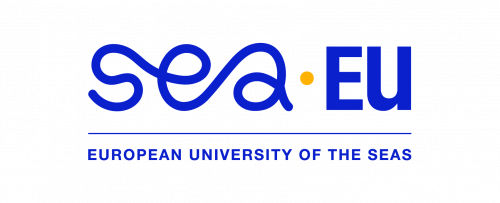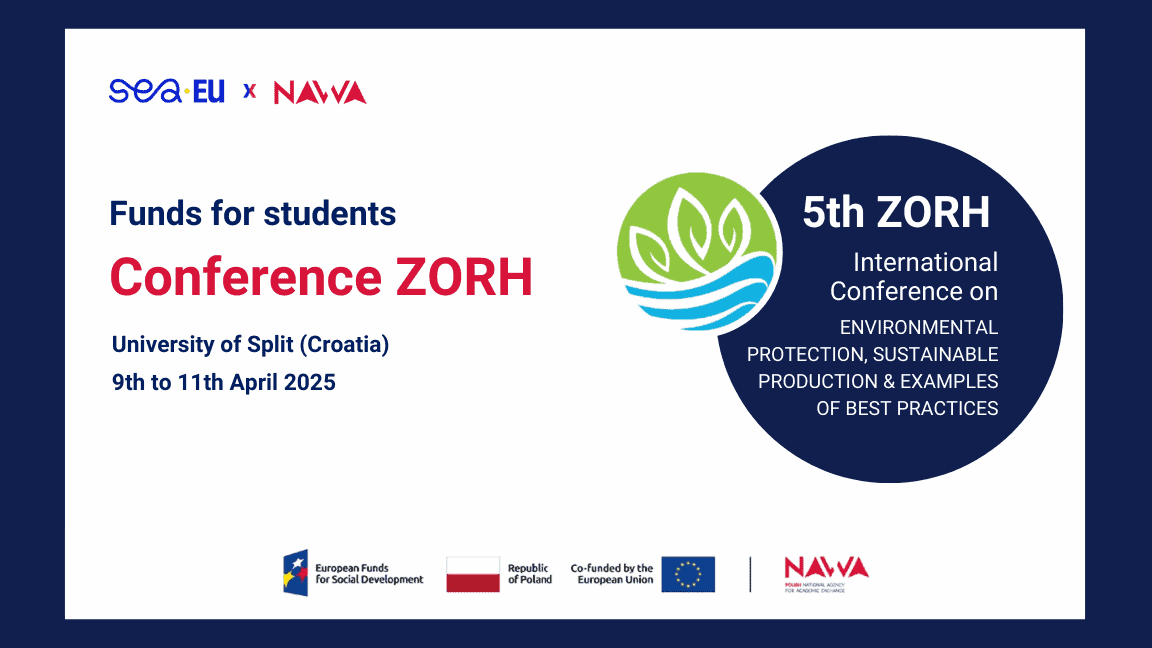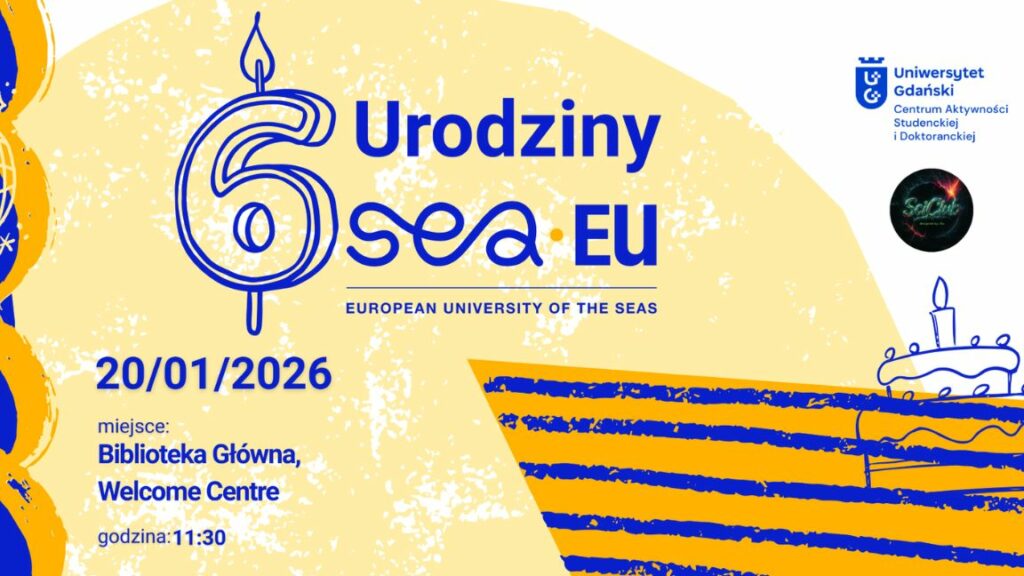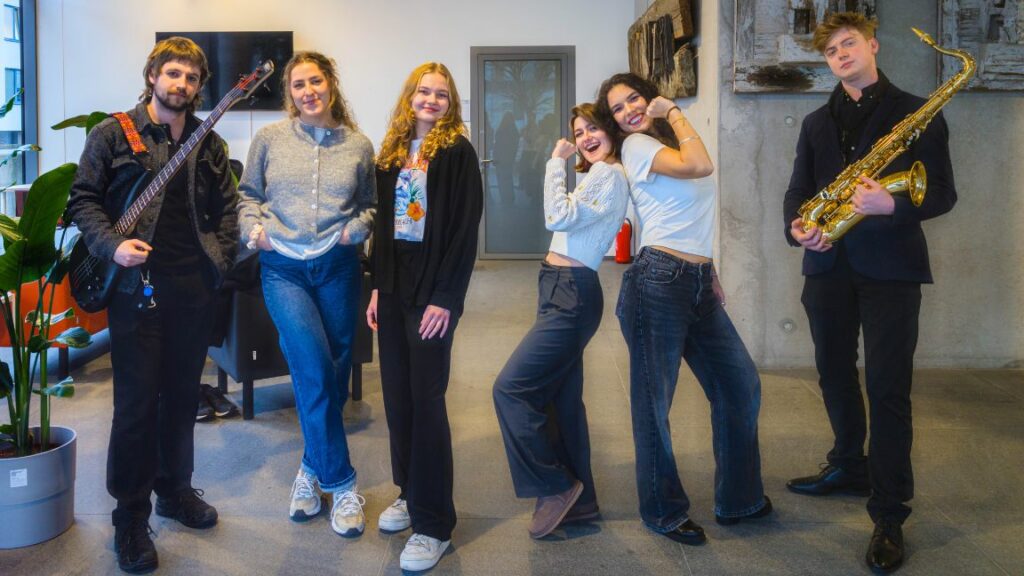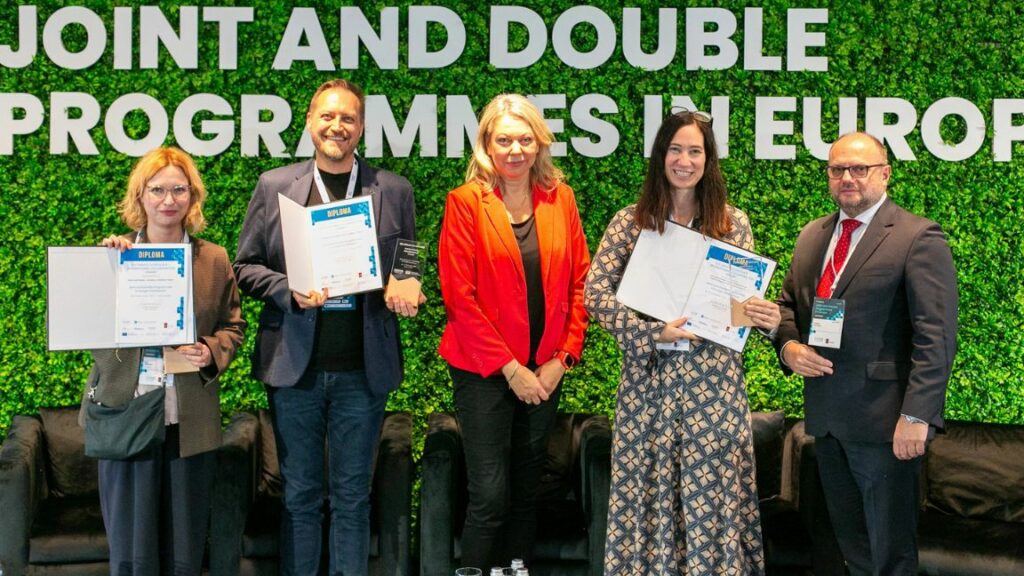Note! The possibility to submit an abstract for the conference ended on March 3rd, 2025. Currently, the recruitment process is underway for individuals whose abstracts have been accepted by the organizers. Details of the announcement were available on the ZORH website – International Environmental Protection Conference | SEA-EU.
Recruitment Rules for International Mobility within the SEA-nergy Project
BASIC INFORMATION
Name
ZORH – International Environmental Protection Conference
Objective
The aim of the conference is to increase knowledge on environmental protection issues and innovative solutions for contemporary ecological challenges, as well as to develop soft skills such as self-presentation and public speaking.
Destination and duration of mobility
The international mobility will take place at the SEA-EU partner, the University of Split, from April 9th to April 11th, 2025.
Detailed program: https://zorh.ktf-split.hr/en/program-2/
Set of learning outcomes (competencies):
- Understanding the role of intersectoral cooperation in the context of environmental protection
- Engaging communities in environmental protection actions
- Communicating messages through public presentations/posters
Learning outcomes:
Knowledge
The candidate:
1.1. has the knowledge of the rationale and benefits of intersectoral cooperation,
1.2. has the knowledge of methods and tools used to engage communities in environmental protection activities,
1.3. has the knowledge of the principles of effectively conveying information through public presentations and posters,
Skills:
The candidate:
2.1. can plan and implement activities that engage the community in environmental protection issues,
2.2. is able to identify appropriate environmental solutions for specific problems and implement them effectively in practice,
2.3. can present their ideas effectively,
Social competencies:
The candidate:
3.1. can collaborate effectively with representatives from different sectors,
3.2. develops the ability to communicate with an audience during oral presentations/posters,
3.3. can manage stress related to presenting their knowledge and expressing opinions in an international environment.
Criteria for assessing learning outcomes:
The candidate:
| Learning outcome | Verification criteria | Verification method |
| 1.1. has knowledge of the rationale and benefits of intersectoral cooperation in the context of environmental protection | 1.1.1 can explain why intersectoral cooperation is important for environmental protection. 1.1.2 Understands the key principles of cooperation between the public, private, and academic sectors. | Test |
| 1.2. has the knowledge of methods and tools used to engage communities in environmental protection activities | 1.2.1 can list and describe effective community engagement strategies. 1.2.2 knows examples of successful initiatives that engage communities in environmental protection. | Test |
| 1.3. has the knowledge of the principles of effectively conveying information through public presentation/poster | 1.3.1 knows the principles of graphic design that help in conveying information. 1.3.2 understands how to tailor the message to the target audience, considering their needs and level of knowledge. | Test |
| 2.1. can plan and implement activities that engage the community in environmental protection issues | 2.1.1 can plan a campaign aimed at raising environmental awareness. 2.1.2 actively engages in discussions on intersectoral cooperation and takes initiative. | Test |
| 2.2. can identify appropriate environmental solutions for specific problems and effectively implement them in practice | 2.2.1 can design an implementation plan for a specific environmental solution. 2.2.2 can use appropriate communication tools to effectively engage the target audience. | Test |
| 2.3. can present its ideas effectively | 2.3.1 can adjust the content of the presentation to the available time and format. 2.3.2 can use multimedia tools to strengthen its message. | Test |
| 3.1. can effectively collaborate with representatives from different sectors | 3.1.1 communicates constructively, taking into account the interests of different groups. | Test |
| 3.2. develops the skill of communicating with an audience during oral presentation/poster | 3.2.1 effectively conveys information, ensuring clarity, fluency, and comprehensibility in their presentation. 3.2.2 responds to questions and doubts from the audience thoughtfully and substantively. | Test |
| 3.3. copes with the stress associated with presenting knowledge and expressing opinions in an international environment | 3.3.1 is able to maintain eye contact with the audience. 3.3.2 – pays attention to the pace of the presentation. | Test |
REQUIREMENTS FOR MOBILITY
Participants of the mobility
To apply for the mobility, candidate must be an active student of the University of Gdańsk on the day of applying for the recruitment process and the planned mobility. Applicants are not allowed to be on any type of leave.
The participant’s declared English language level is a minimum of B1.
Recruitment
All applicants are required to fill out a special registration form: https://forms.office.com/e/Nr5ZKCJFH8. One of the components of the form is a cover letter justifying the choice of mobility which should serve to enhance competencies. The form must be completed and submitted by March 16th, 2025.
The order in which funding is granted depends on the total number of points obtained – applications with higher points will be given priority in the allocation of funding and will be processed according to the ranking list.
To qualify for the mobility, applicants must submit a complete set of required documents and meet the mobility requirements (in particular, confirmation of abstract acceptance by the organizers is required). Funding has been allocated for five participants (4 papers, 1 poster).
Recruitment is conducted in accordance with the horizontal principles outlined in § 2 point 8 of the Project Regultions. If support is needed during the recruitment process for persons with disabilities or special needs, please contact the task coordinator seaenergy@ug.edu.pl.
Recruitment criteria
| 1 | Formal criteria | Achieved |
| student status | ||
| initial English language level: minimum B1 | ||
| abstract accepted by the ZORH scientific committee | ||
| complete application | ||
| Merit criteria | Scoring | |
| 2 | evaluation of the cover letter justifying the choice of mobility which should serve to enhance competencies | 0-5 |
| 3 | compatibility of the thematic scope of the mobility with the implemented study program | 0-5 |
| 4 | compatibility of the thematic scope of the mobility with the thesis written or being written in the realized/executed field of study | 0-5 |
Recruitment results
The committee responsible for verifying and evaluating the applications is required to prepare a ranking list, divided into qualified, reserve, and non-qualified candidates. All participants will be individually informed about the results via email by March 18th, 2025. The list of successful candidates will also be available on the website https://sea-eu.ug.edu.pl/aktualnosci/.
RULES FOR PROVIDING SUPPORT
Financial support may be granted for the mobility period from April 9th–11th, 2025, plus two days for travel. The funding will be paid as a lump sum of approximately 3875 PLN and will cover travel expenses, accommodation, and allowances.
Documentation before mobility Those who are qualified to participate in the mobility must complete the following:
- an online pre-test to assess the participants’ level of knowledge and skills in the subject matter covered by the conference before starting the course,
- registration on the NAWA platform to confirm the participant’s eligibility for the project.
Documentation after mobility Those who complete the mobility are required to:
- fill out an online post-test to measure their knowledge and skills after the course is completed,
- provide the original certificate confirming their stay at the partner university.
Completion of mobility Those who, according to the test, have improved their competencies during the mobility will receive a certificate.
Contact to Coordinator: seaenergy@ug.edu.pl
The initiative is being implemented as part of the project „Support for Synergistic and Complementary Actions of the SEA-EU 2.0 Project – SEA-nergy,” which is a component of the NAWA program „Support for European University Alliances” funded by the European Social Fund.
